1
The acceptance of oneself is the essence of the whole moral problem and the epitome of a whole outlook on life. That I feed the hungry, that I forgive an insult, that I love my enemy in the name of Christ -- all these are undoubtedly great virtues. What I do unto the least of my brethren, that I do unto Christ. But what if I should discover that the least among them all, the poorest of all the beggars, the most impudent of all the offenders, the very enemy himself -- that these are within me, and that I myself stand in need of the alms of my own kindness -- that I myself am the enemy who must be loved -- what then? As a rule, the Christian's attitude is then reversed; there is no longer any question of love or long-suffering; we say to the brother within us "Raca, " and condemn and rage against ourselves. We hide it from the world; we refuse to admit ever having met this least among the lowly in ourselves.C.g. Jung
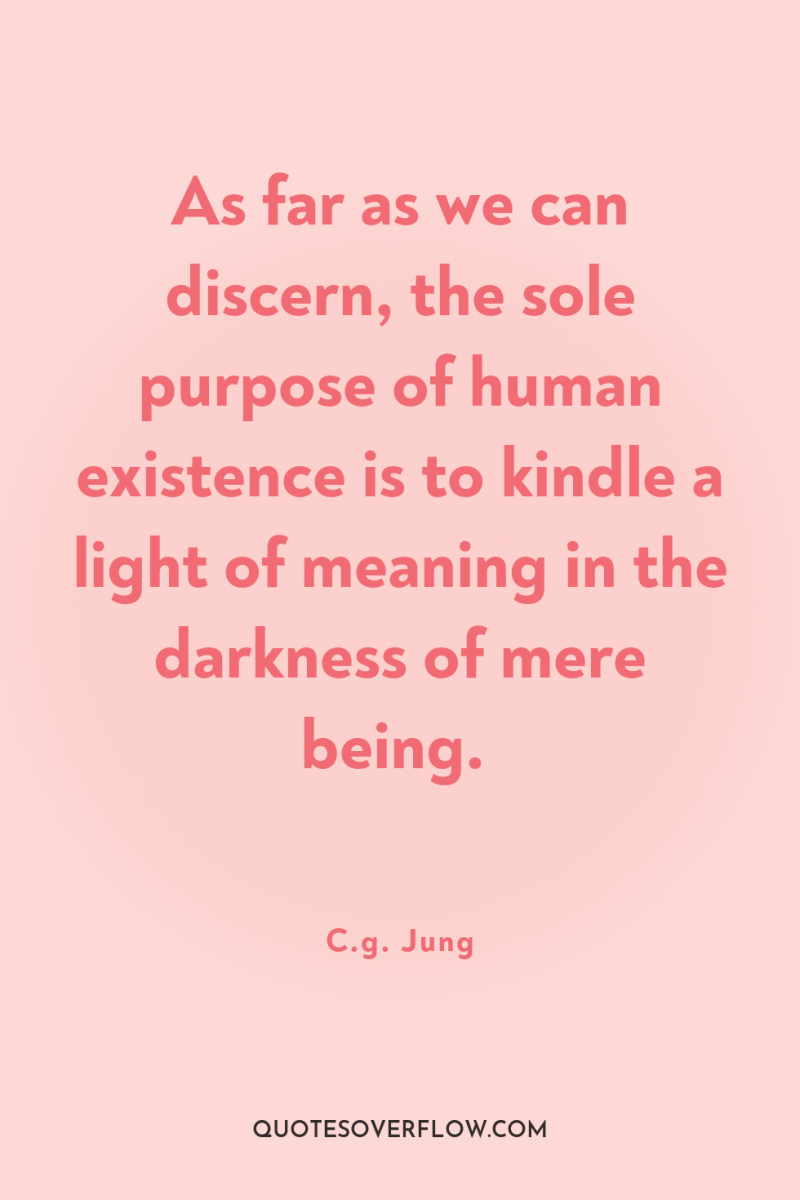
2
As far as we can discern, the sole purpose of human existence is to kindle a light of meaning in the darkness of mere being.C.g. Jung
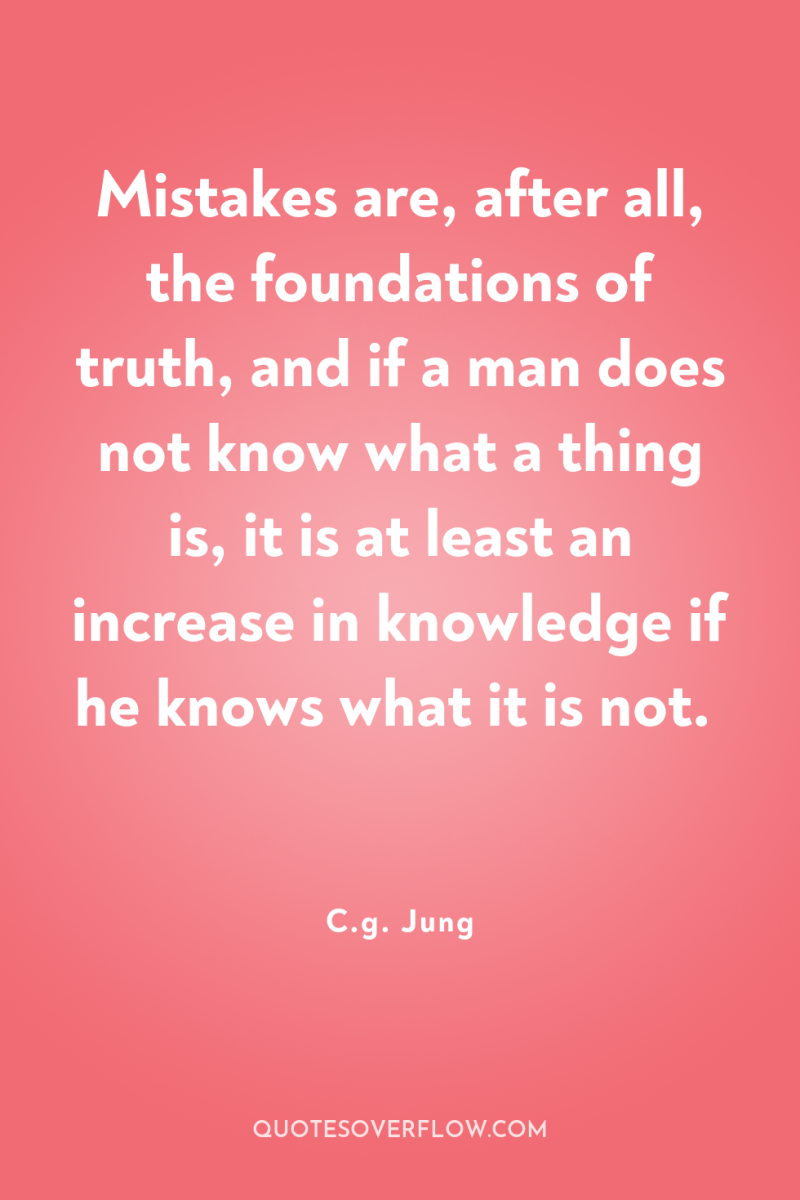
3
Mistakes are, after all, the foundations of truth, and if a man does not know what a thing is, it is at least an increase in knowledge if he knows what it is not.C.g. Jung
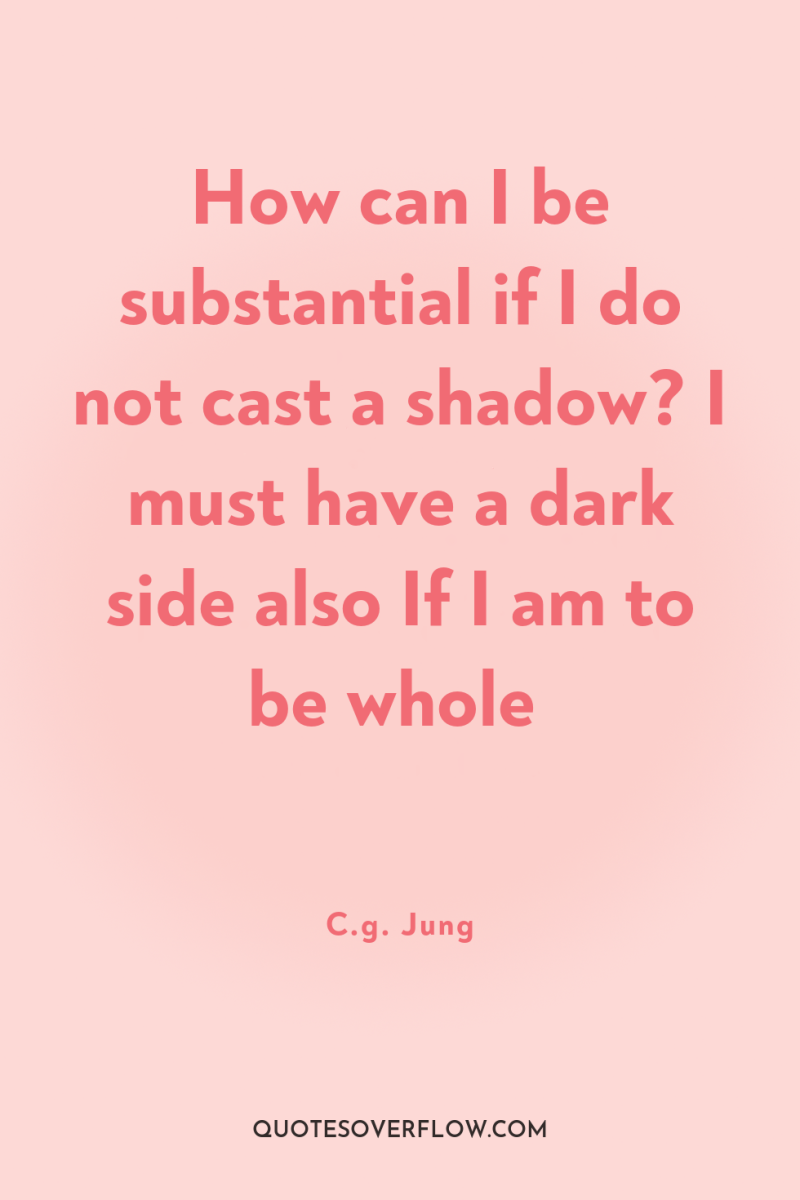
4
How can I be substantial if I do not cast a shadow? I must have a dark side also If I am to be wholeC.g. Jung
5
Even a happy life cannot be without a measure of darkness, and the word happy would lose its meaning if it were not balanced by sadness.C.g. Jung
6
I have frequently seen people become neurotic when they content themselves with inadequate or wrong answers to the questions of life. They seek position, marriage, reputation, outward success of money, and remain unhappy and neurotic even when they have attained what they were seeking. Such people are usually confined within too narrow a spiritual horizon. Their life has not sufficient content, sufficient meaning. If they are enabled to develop into more spacious personalities, the neurosis generally disappears.C.g. Jung
7
Even a happy life cannot be without a measure of darkness, and the word happy would lose its meaning if it were not balanced by sadness. It is far better take things as they come along with patience and equanimity.C.g. Jung
8
The gods have become our diseases.C.g. Jung
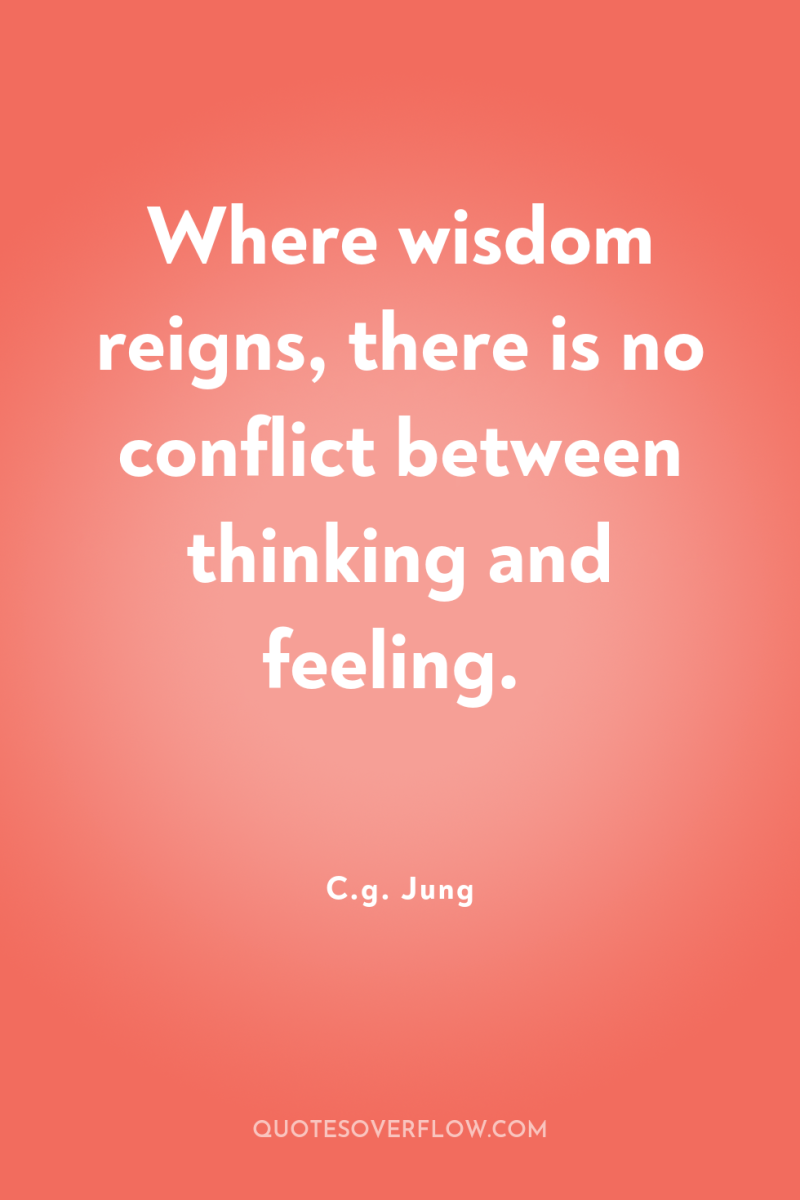
9
Where wisdom reigns, there is no conflict between thinking and feeling.C.g. Jung
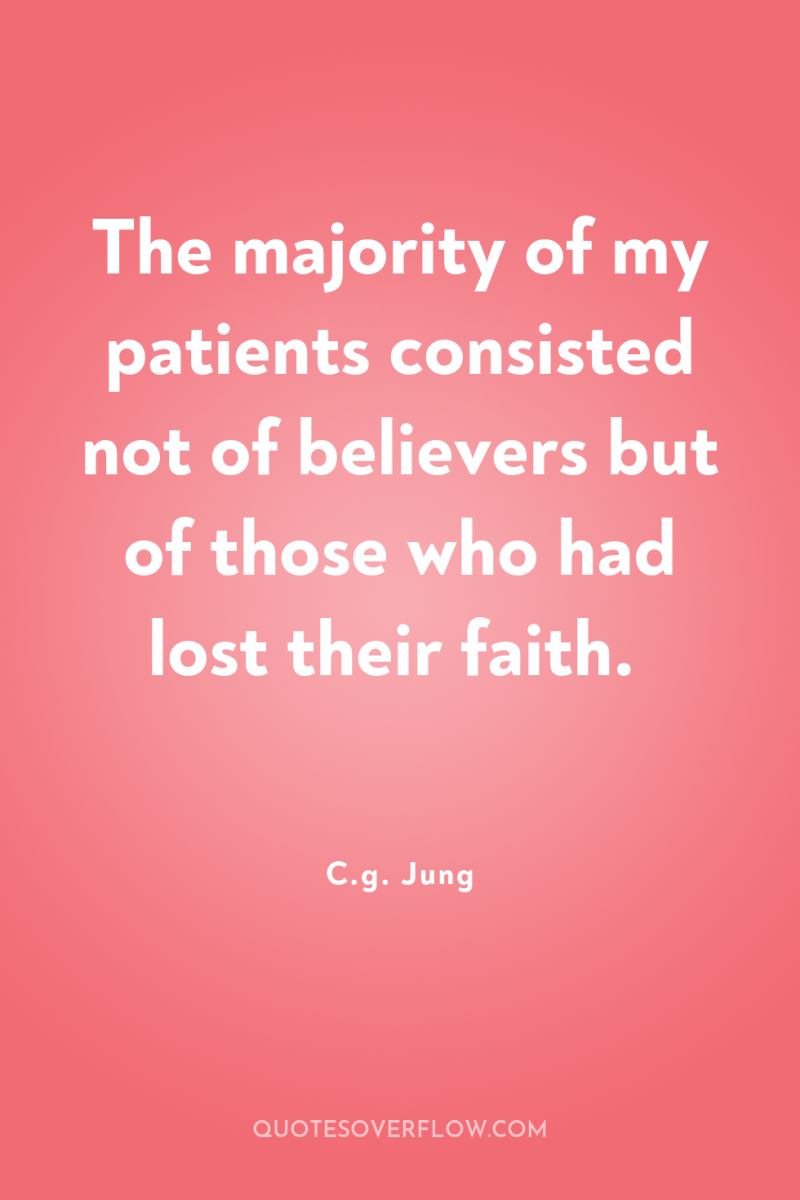
10
The majority of my patients consisted not of believers but of those who had lost their faith.C.g. Jung
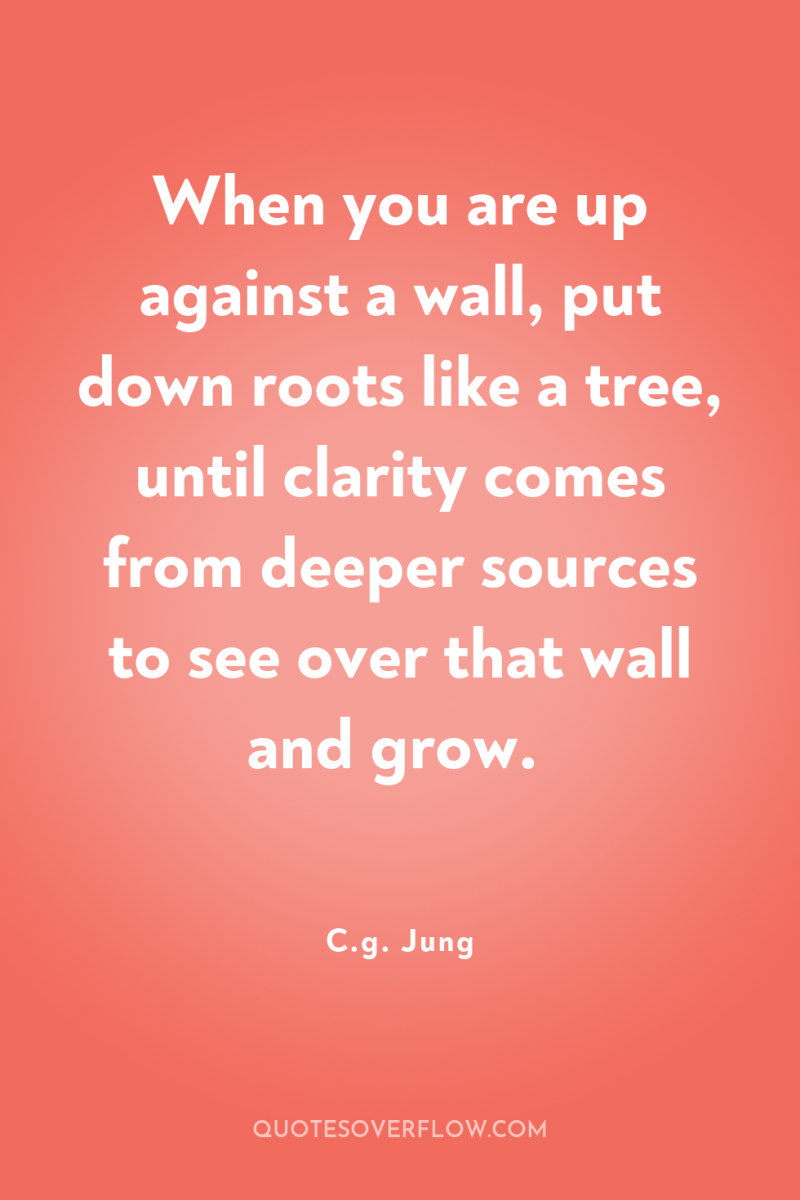
11
When you are up against a wall, put down roots like a tree, until clarity comes from deeper sources to see over that wall and grow.C.g. Jung
12
With a truly tragic delusion, ” Carl Jung noted, “these theologians fail to see that it is not a matter of proving the existence of the light, but of blind people who do not know that their eyes could see. It is high time we realized that it is pointless to praise the light and preach it if nobody can see it. It is much more needful to teach people the art of seeing.C.g. Jung
13
I have treated many hundreds of patients. Among those in the second half of life - that is to say, over 35 - there has not been one whose problem in the last resort was not that of finding a religious outlook on life. It is safe to say that every one of them fell ill because he had lost that which the living religions of every age have given their followers, and none of them has really been healed who did not regain his religious outlook.C.g. Jung
14
Christians often ask why God does not speak to them, as he is believed to have done in former days. When I hear such questions, it always makes me think of the rabbi who asked how it could be that God often showed himself to people in the olden days whereas nowadays nobody ever sees him. The rabbi replied: "Nowadays there is no longer anybody who can bow low enough." This answer hits the nail on the head. We are so captivated by and entangled in our subjective consciousness that we have forgotten the age-old fact that God speaks chiefly through dreams and visions. The Buddhist discards the world of unconscious fantasies as useless illusions; the Christian puts his Church and his Bible between himself and his unconscious; and the rational intellectual does not yet know that his consciousness is not his total psyche.C.g. Jung
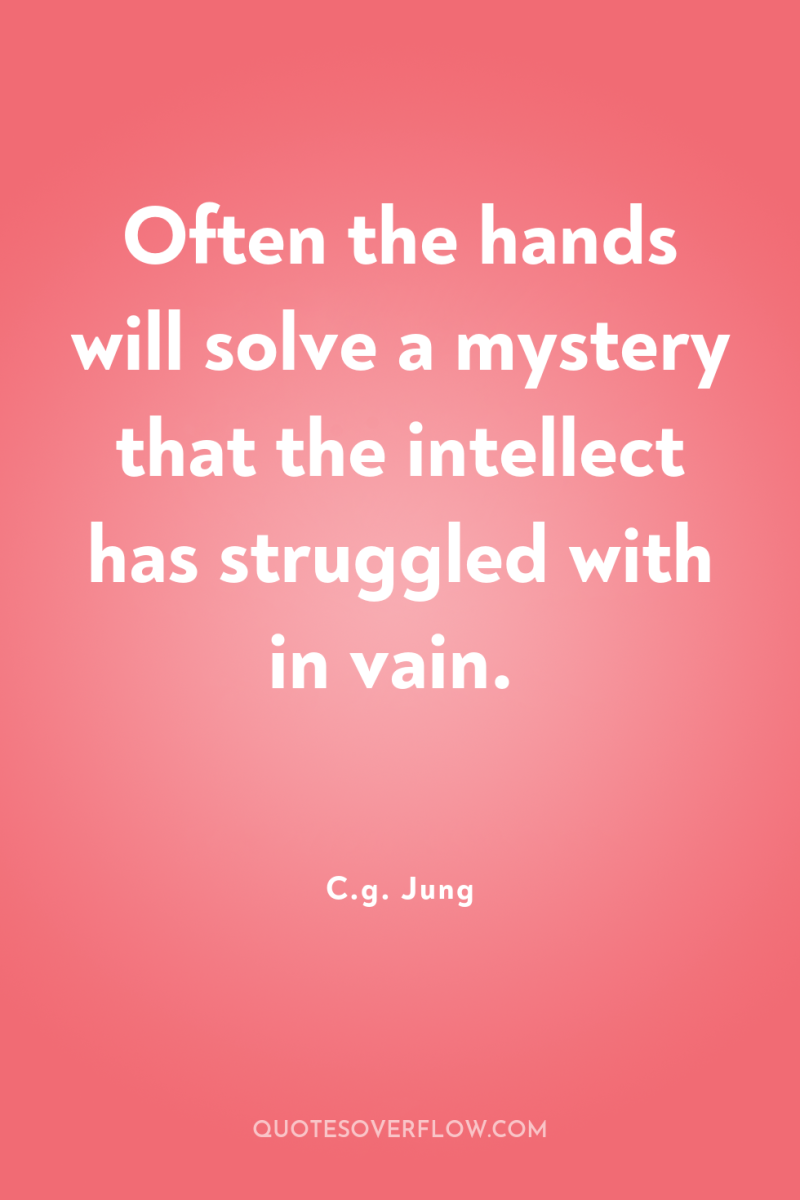
15
Often the hands will solve a mystery that the intellect has struggled with in vain.C.g. Jung
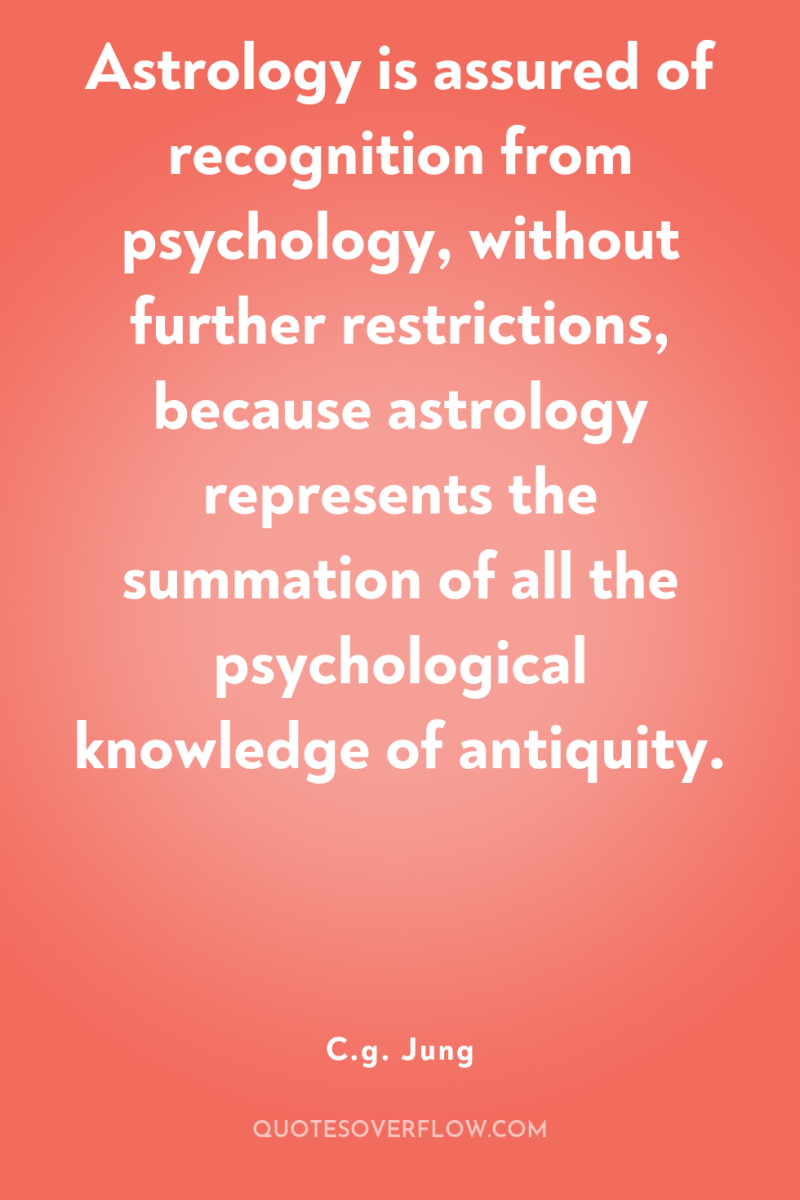
16
Astrology is assured of recognition from psychology, without further restrictions, because astrology represents the summation of all the psychological knowledge of antiquity.C.g. Jung
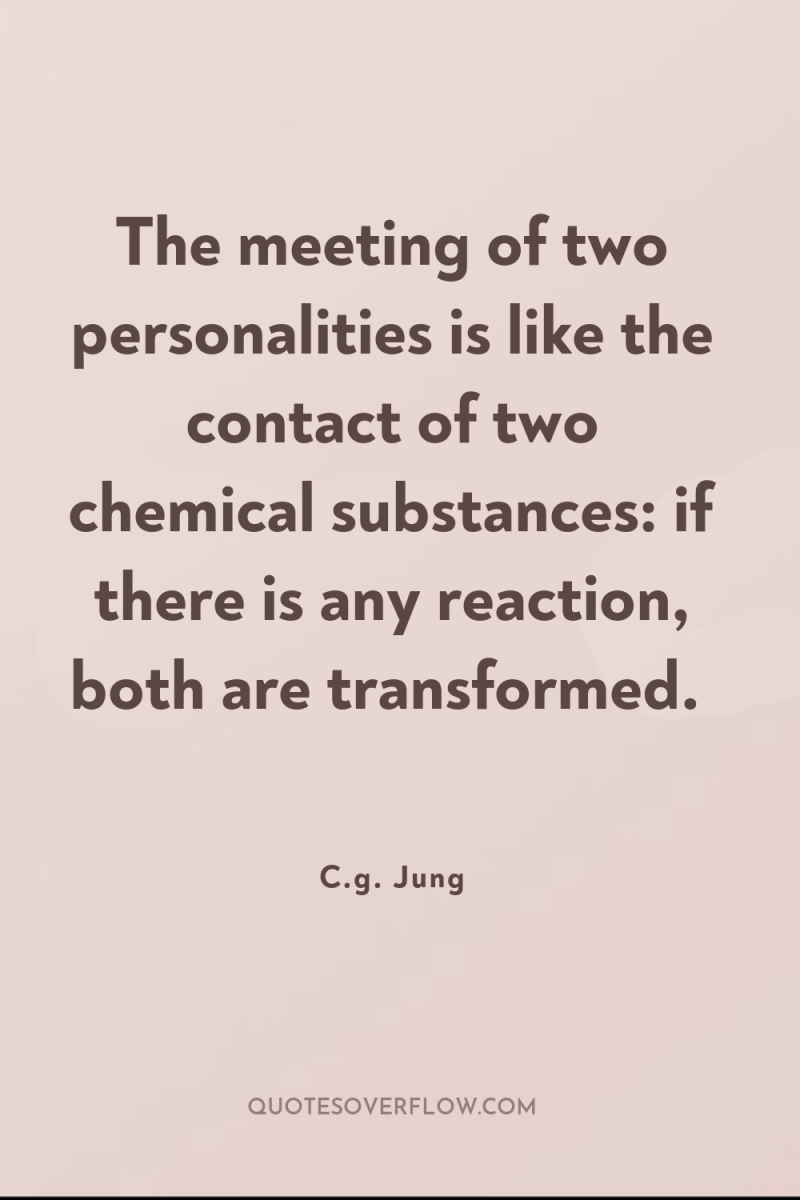
17
The meeting of two personalities is like the contact of two chemical substances: if there is any reaction, both are transformed.C.g. Jung
18
But it seems to me to be an imperfection in things of beauty, and a weakness in man, if an explanation from the shallow-side has a destructive effect. The horror which we feel for Freudian interpretations is entirely due to our own barbaric or childish naivete, which believes that there can be heights without corresponding depths, and which blinds us to the really "final" truth that, when carried to extremes, opposites meet.C.g. Jung
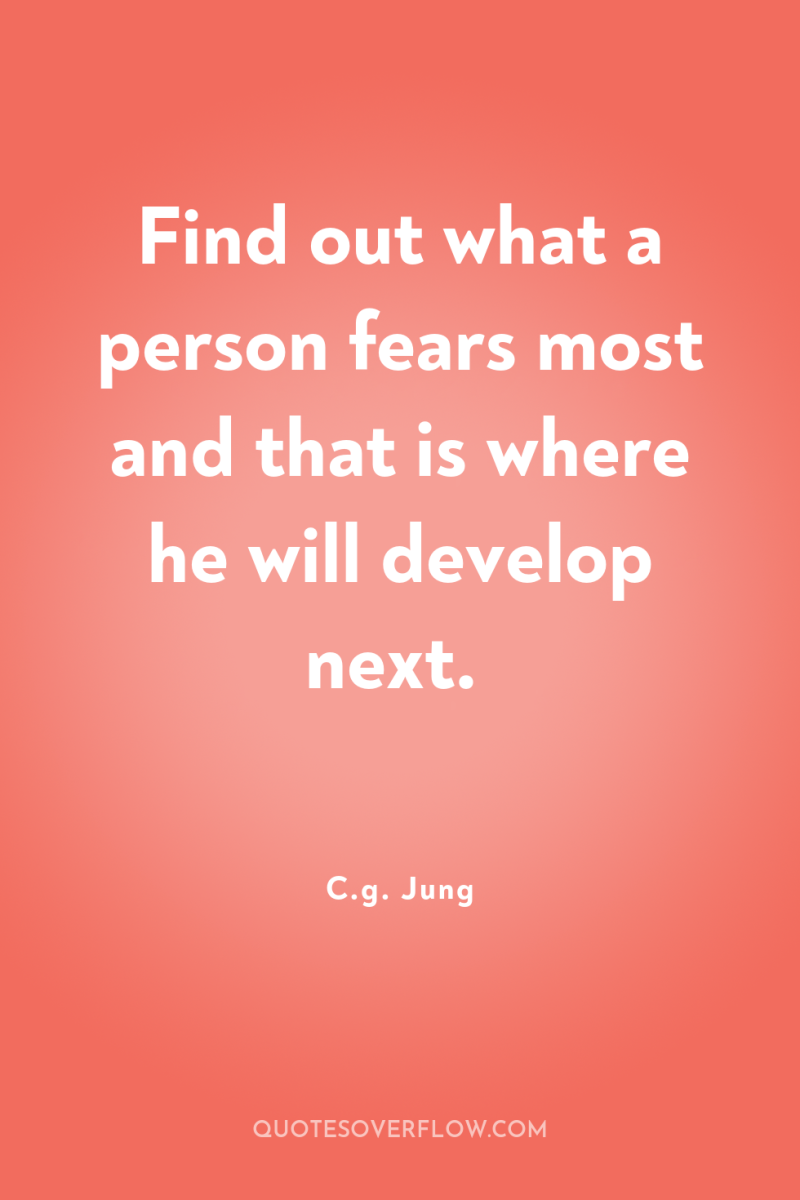
19
Find out what a person fears most and that is where he will develop next.C.g. Jung
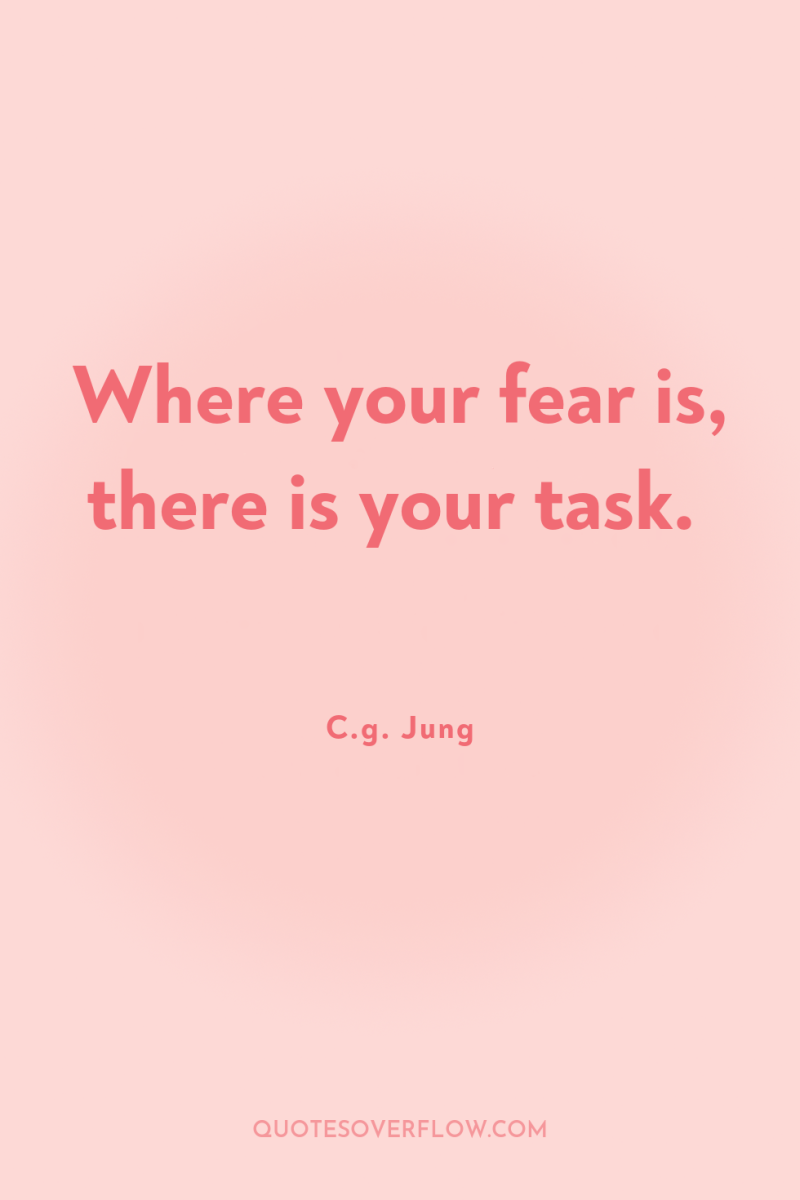
20
Where your fear is, there is your task.C.g. Jung
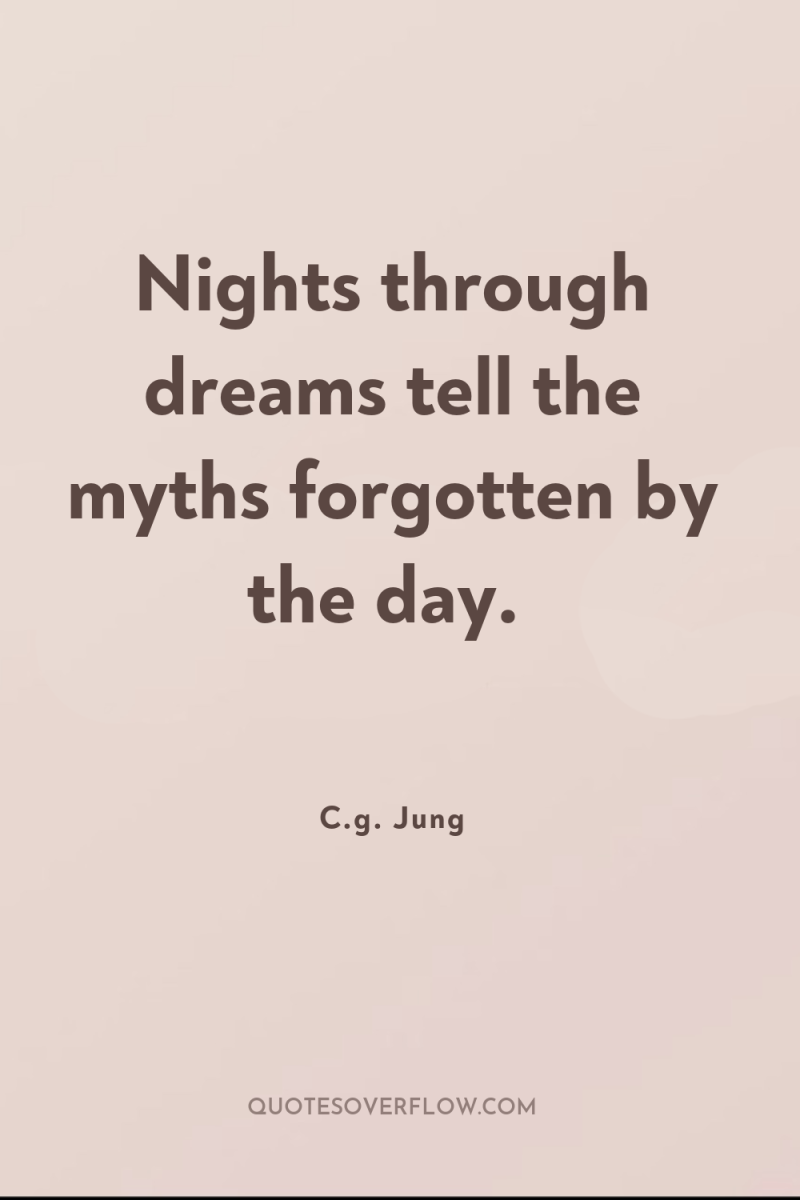
21
Nights through dreams tell the myths forgotten by the day.C.g. Jung
22
The girl dreams she is dangerously ill. Suddenly birds come out of her skin and cover her completely ... Swarms of gnats obscure the sun, the moon, and all the stars except one. That one start falls upon the dreamer.C.g. Jung
23
The sight of a child…will arouse certain longings in adult, civilized persons – longings which relate to the unfulfilled desires and needs of those parts of the personality which have been blotted out of the total picture in favor of the adapted persona.C.g. Jung
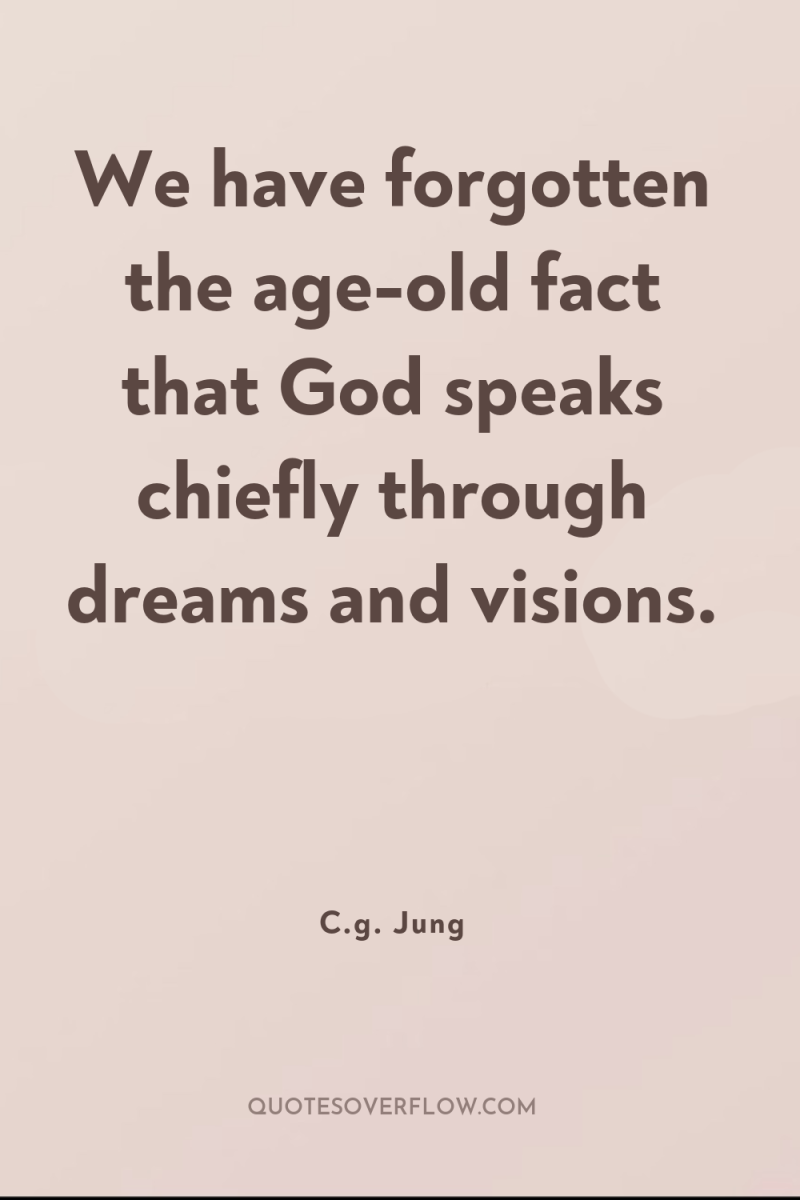
24
We have forgotten the age-old fact that God speaks chiefly through dreams and visions.C.g. Jung
25
The dream is the small hidden door in the deepest and most intimate sanctum of the soul, which opens to that primeval cosmic night that was soul long before there was conscious ego and will be soul far beyond what a conscious ego could ever reach.C.g. Jung
26
I myself recently dreamed that a UFO came speeding towards me which turned out to be the lens of a magic lantern whose projected image was myself; this suggested to me that I was the figure, himself deep in meditation, who is produced by a meditating yogi.C.g. Jung
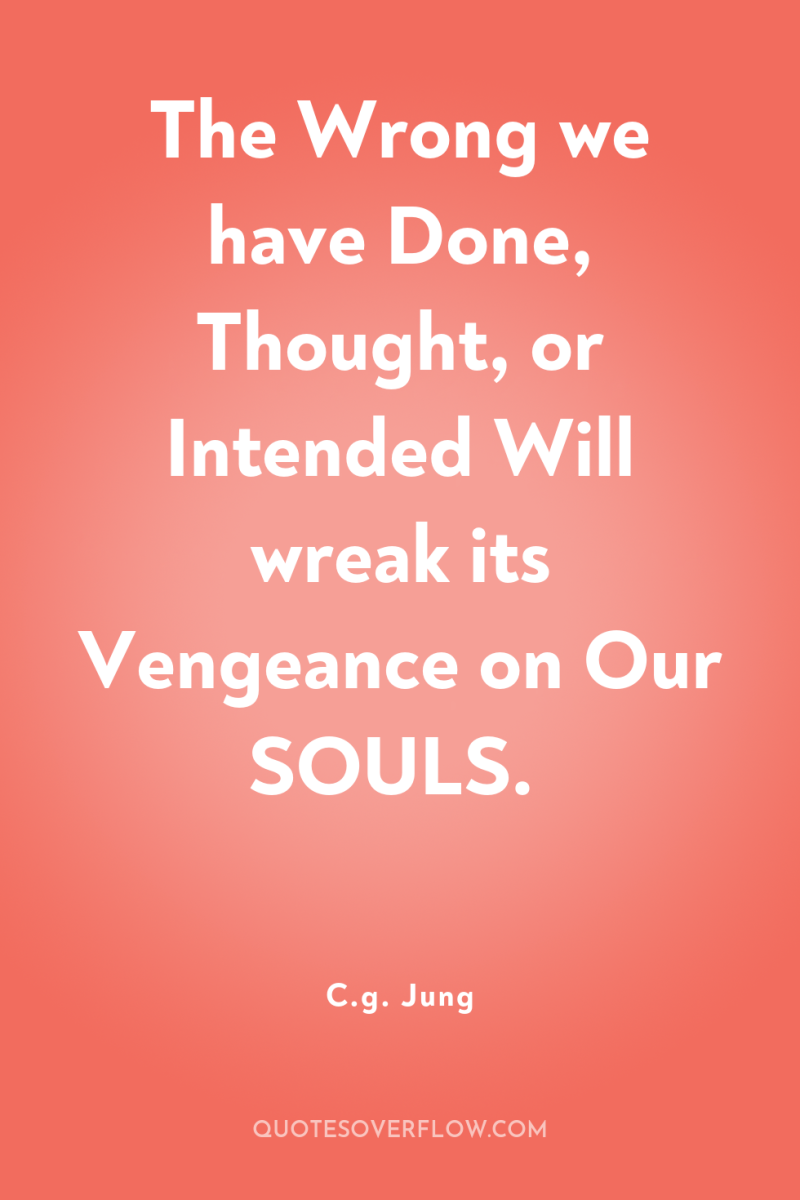
27
The Wrong we have Done, Thought, or Intended Will wreak its Vengeance on Our SOULS.C.g. Jung
28
My soul, where are you? Do you hear me? I speak, I call you - are you there? I have returned, I am here again. I have shaken the dust of all the lands from my feet, and I have come to you, I am with you. After long years of long wandering, I have come to you again. Should I tell you everything I have seen, experienced, and drunk in? Or do you not want to hear about all the noise of life and the world? But one thing you must know: the one thing I have learned is that one must live this life. Do you still know me? How long the separation lasted! Everything has become so different. And how did I find you? How strange my journey was! What words should I use to tell you on what twisted paths a good star has guided me to you? Give me your hand, my almost forgotten soul. How warm the joy at seeing you again, you long disavowed soul. Life has led me back to you. Let us thank the life I have lived for all the happy and all the sad hours, for every joy, for every sadness. My soul, my journey should continue with you. I will wander with you and ascend to my solitude.C.g. Jung
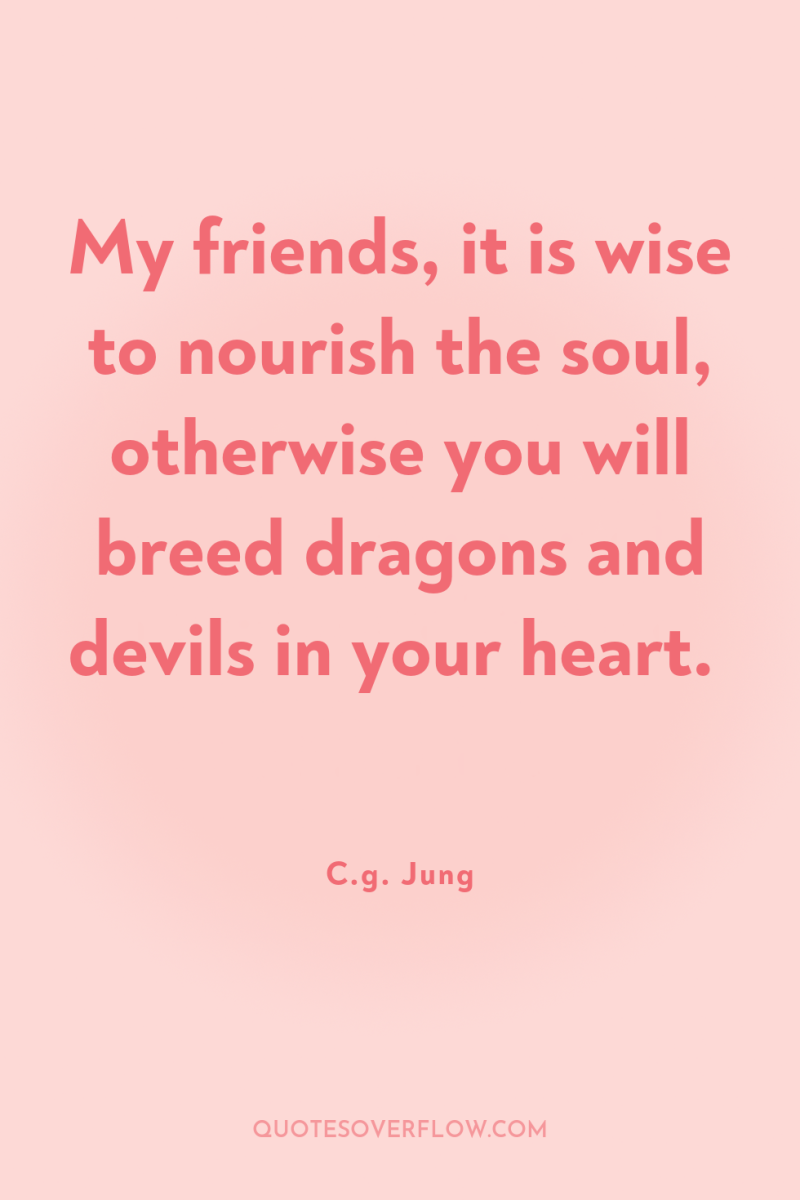
29
My friends, it is wise to nourish the soul, otherwise you will breed dragons and devils in your heart.C.g. Jung
30
Art is a kind of innate drive that seizes a human being and makes him its instrument. To perform this difficult office it is sometimes necessary for him to sacrifice happiness and everything that makes life worth living for the ordinary human being.C.g. Jung
31
The biographies of great artists make it abundantly clear that the creative urge is often so imperious that it battens on their humanity and yokes everything to the service of the work, even at the cost of health and ordinary human happiness. The unborn work in the psyche of the artist is a force of nature that achieves its end either with tyrannical might or with the subtle cunning of nature herself, quite regardless of the personal fate of the man who is its vehicle. The creative urge lives and grows in him like a tree in the earth from which it draws its nourishment.C.g. Jung
32
The creative process, so far as we are able to follow it at all, consists in the unconscious activation of an archetypal image, and in elaborating and shaping this image into the finished work. By giving it shape, the artist translates it into the language of the present, and so makes it possible for us to find our way back to the deepest springs of life. Therein lies the social significance of art: it is constantly at work educating the spirit of the age, conjuring up the forms in which the age is most lacking.C.g. Jung
33
The pendulum of the mind oscillates between sense and nonsense, not between right and wrong.C.g. Jung
34
In the last analysis, the essential thing is the life of individual. This alone makes history, here alone do the great transformations take place, and the whole future, the whole history of the world, ultimately springs as a gigantic summation from these hidden source in individuals.C.g. Jung
35
We are still living in a wonderful new world where man thinks himself astonishingly new and "modern." This is unmistakable proof of the youthfulness of human consciousness, which has not yet grown aware of its historical antecedents.C.g. Jung
36
If you think along the lines of Nature then you think properly." from the video "Carl Jung speaks about deathC.g. Jung
37
It is the truth, a force of nature that expresses itself through me —Â I am only a channel — I can imagine in many instances where I would become sinister to you. For instance, if life had led you to take up an artificial attitude, then you wouldn't be able to stand me, because I ama natural being. By my very presence I crystallize; I am a ferment. The unconscious of people who live in an artificial manner senses me as a danger. Everything about me irritates them, my way of speaking, my way of laughing. They sense nature.C.g. Jung
38
It is the truth, a force of nature that expresses itself through me — I am only a channel — I can imagine in many instances where I would become sinister to you. For instance, if life had led you to take up an artificial attitude, then you wouldn't be able to stand me, because I am a natural being. By my very presence I crystallize; I am a ferment. The unconscious of people who live in an artificial manner senses me as a danger. Everything about me irritates them, my way of speaking, my way of laughing. They sense nature.C.g. Jung
39
I never think that I am the one who must see to it that cherries grow on stalksC.g. Jung
40
In spite of our proud domination of nature, we are still her victims, for we have not even learned to control our nature.C.g. Jung
41
There is no coming to consciousness without pain. People will do anything, no matter how absurd, in order to avoid facing their own Soul. One does not become enlightened by imagining figures of light, but by making the darkness conscious.C.g. Jung
42
If I want to understand an individual human being, I must lay aside all scientific knowledge of the average man and discard all theories in order to adopt a completely new and unprejudiced attitude. I can only approach the task of understanding with a free and open mind, whereas knowledge of man, or insight into human character, presupposes all sorts of knowledge about mankind in general.C.g. Jung
43
If only a world-wide consciousness could arise that all division and fission are due to the splitting of opposites in the psyche, then we should know where to begin.C.g. Jung
44
The State in particular is turned into a quasi-animate personality from whom everything is expected. In reality it is only a camouflage for those individuals who know how to manipulate it.C.g. Jung
45
Every form of addiction is bad, no matter whether the narcotic be alcohol, morphine or idealism.C.g. Jung
46
As a child I felt myself to be alone, and I am still, because I know things and must hint at things which others apparently know nothing of, and for the most part do not want to know.C.g. Jung
47
Whatever is rejected from the self, appears in the world as an event.C.g. Jung
48
Through pride we are ever deceiving ourselves. But deep down below the surface of the average conscience a still, small voice says to us, something is out of tune.C.g. Jung
49
Sensation tell us a thing is. Thinking tell us what it is this thing is. Feeling tells us what this thing is to us.C.g. Jung
50
To find out what is truly individual in ourselves, profound reflection is needed; and suddenly we realize how uncommonly difficult the discovery of individuality is.C.g. Jung
51
The stone has no uncertainties, no urge to communicate, and is eternally the same for thousands of years, while I am only a passing phenomenon which bursts into all kinds of emotions, like a flame that flares up quickly and then goes out.C.g. Jung
52
‎"...the sole purpose of human existence is to kindle a light in the darkness of mere being.C.g. Jung
53
The psychopathology of the masses is rooted in the psychology of the individualC.g. Jung
54
There is no Archimedean point from which to judge, since the psyche is indistinguishable from its manifestations. The psyche is the object of psychology, and -fatally enough- also its subject. There is no getting away from this fact." Psychology and Religion" (1938). In CW 11: Psychology and Religion: West and East. P.8C.g. Jung
55
...the mind that is collectively orientated is quite incapable of thinking and feeling in any other way than by projection.C.g. Jung
56
To be quite accurate, human nature is simply what it is; it has its dark and its light sides. The sum of all colours is grey - light on a dark background or dark on light.C.g. Jung
57
The psyche’s attachment to the brain, i.e., its space-time limitation, is no longer as self-evident and incontrovertible as we have hitherto been led to believe. … It is not only permissible to doubt the absolute validity of space-time perception; it is, in view of the available facts, even imperative to do so.C.g. Jung
58
It is not the universal and the regular that characterize the individual, but rather the unique. He is not to be understood as a recurrent unit but as something unique and singular which in the last analysis can be neither known nor compared with anything else.C.g. Jung
59
That you find Kierkegaard "frightful" has warmed the cockles of my heart. I find him simply insupportable and cannot understand, or rather, I understand only too well, why the theological neurosis of our time has made such a fuss over him. You are quite right when you say that the pathological is never valuable. It does, however, cause us the greatest difficulties and for this reason we learn the most from it. .C.g. Jung
60
You know, it is sometimes an ideal not to have any kind of convictions or feelings that are not based upon reality. One must even educate people..that their emotions ought to have a real basis, that they cannot swear hell and damnation at somebody on a mere assumption, and that there are absolute reasons why they are not justified in doing such a thing. They really have to learn that their feelings should be based on facts. But to [develop further] one should unlearn all that. One should even admit that all one's psychical facts have nothing to do with material facts. For instance, the anger which you feel for somebody or something, no matter how justified it is, is not caused by those external things. It is a phenomenon all by itself. That is what we call taking a thing on its subjective level..If you have reached that level..you have succeeded in dissolving the absolute union of material external facts with internal or psychical facts. You begin to consider the game of the world as your game, the people that appear outside as exponents of your psychical condition. Whatever befalls you, whatever experience or adventure you have in the external world, is your own experience. .C.g. Jung
61
As understanding deepens, the further removed it becomes from knowledge.C.g. Jung
62
A million zeros joined together do not, unfortunately, add up to one. Ultimately everything depends on the quality of the individual, but our fatally shortsighted age thinks only in terms of large numbers and mass organizations, though one would think that the world had seen more than enough of what a well-disciplined mob can do in the hands of a single madman. Unfortunately, this realization does not seem to have penetrated very far - and our blindness is extremely dangerous.C.g. Jung
63
The unconscious is not a demoniacal monster, but a natural entity which, as far as moral sense, aesthetic taste, and intellectual judgement go, is completely neutral. It only becomes dangerous when our conscious attitude to it is hopelessly wrong. To the degree that we repress it, its danger increases. But the moment the patient begins to assimilate contents that were previously unconscious, its danger diminishes. The dissociation of personality, the anxious division of the day-time and the night-time sides of the psyche, cease with progressive assimilation.C.g. Jung
64
We all feel that the opposite of our own highest principle must be purely destructive, deadly, and evil. We refuse to endow it with any positive life-force; hence we avoid and fear it.C.g. Jung
65
The goal and meaning of individual life (which is the only real life) no longer lie in individual development but in the policy of the State, which is thrust upon the individual from outside and consists in the execution of an abstract idea which ultimately tends to attract all life to itself.C.g. Jung
66
But the shadow is merely somewhat inferior, primitive, unadapted, and awkward; not wholly bad. It even contains childish or primitive qualities which would in a way vitalize and embellish human existence, but convention forbids!C.g. Jung
67
There are people, of course, who think it unscientific to take anything seriously; they do not want their intellectual playground disturbed by graver considerations. But the doctor who fails to take account of man's feelings for values commits a serious blunder, and if he tries to correct the mysterious and well-nigh inscrutable workings of nature with his so-called scientific attitude, he is merely putting his shallow sophistry in place of nature's healing processes.C.g. Jung
68
People think you have only to ‘tell’ a person that he ‘ought’ to do something in order to put him on the right track. But whether he can or will do it is another matter.C.g. Jung
69
Is that which science calls the “psyche” not merely a question-mark arbitrarily confined within the skull, but rather a door that opens upon the human world from a world beyond, now and again allowing strange and unseizable potencies to act upon him and to remove him, as if upon the wings of the night, from the level of common humanity to that of a more personal vocation?C.g. Jung
70
I shall not commit the fashionable stupidity of regarding everything I cannot explain as a fraud. ”–Psychiatrist Dr. Carl Jung in a 1919 address to the Society for Psychical Research in EnglandC.g. Jung
71
Creative power is mightier than its possessor.C.g. Jung
72
The creative mind plays with the object it loves.C.g. Jung
73
There is a desert on the moon where the dreamer sinks so deeply into the ground that she reaches hell.C.g. Jung
74
One does not become enlightened by imagining figures of light, but by making the darkness conscious. The latter procedure, however, is disagreeable and therefore not popular.C.g. Jung
75
The unconscious always tries to produce an impossible situation in order to force the individual to bring out his very best. Otherwise one stops short of one's best, one is not complete, one does not realize oneself. What is needed is an impossible situation where one has to renounce one's own will and one's own wit and do nothing but wait and trust to the impersonal power of growth and development.C.g. Jung
76
The mass State has no intention of promoting mutual understanding and the relationship of man to man; it strives, rather, for atomization, for the psychic isolation of the individual.C.g. Jung
77
That I feed the beggar, that I forgive an insult, that I love my enemy in the name of Christ, all these are undoubtedly great virtues. What I do unto the least o’ my brethren, that I do unto Christ. But what if I should discover that the least amongst them all, the poorest of all beggars, the most impudent of all offenders, yeah, the very fiend himself, that these are within me, and that I myself stand in need of the alms of my own kindness, that I myself am the enemy who must be loved. What then? Then, as a rule, the whole truth of Christianity is reversed: there is then no more talk of love and long-suffering; we say to the brother within us “Raca, ” and condemn and rage against ourselves. We hide him from the world, we deny ever having met this least among the lowly in ourselves, and had it been God himself who drew near to us in this despicable form, we should have denied him a thousand times before a single cock had crowed.C.g. Jung
78
That we are bound to the earth does not mean that we cannot grow; on the contrary it is the sine qua non of growth. No noble, well-grown tree ever disowned its dark roots, for it grows not only upward but downward as well.C.g. Jung
79
I simply believe that some part of the human Self or Soul is not subject to the laws of space and time.C.g. Jung
80
You do not have an inferior function, it has you.C.g. Jung
81
The most terrifying thing is to accept oneself completely.C.g. Jung
82
Carl Jung never said: “There is no coming to consciousness without pain. People will do anything, no matter how absurd, in order to avoid facing their own Soul. One does not become enlightened by imagining figures of light, but by making the darkness conscious.” What Dr. Jung said in two separate and unrelated statements was: Seldom, or perhaps never, does a marriage develop into an individual relationship smoothly and without crises; there is no coming to consciousness without pain. ~Carl Jung, Contributions to Analytical Psychology, P. 193People will do anything, no matter how absurd, in order to avoid facing their own souls. One does not become enlightened by imagining figures of light, but by making the darkness conscious. ~Carl Jung, Psychology and Alchemy, Page 99.C.g. Jung
83
When an inner situation is not made conscious it appears outside as fate.C.g. Jung
84
What is not brought to consciousness, comes to us as fate.C.g. Jung
85
The reason for evil in the world is that people are not able to tell their stories.C.g. Jung
86
The healthy man does not torture others - generally it is the tortured who turn into torturers. Carl JungSwiss psychologist (1875 - 1961)C.g. Jung
87
In each of us there is another whom we do not know. Carl Jungfound in David Eagleman's book: IncognitoC.g. Jung
88
There is no place where those striving after consciousness could find absolutely safety. Doubt and insecurity are indispensable components of a complete life. Only those who can lose this life really can gain it. A complete life does not consist in a theoretical completeness, but in the fact that one accepts, without reservation, the particular fatal issue in which one finds oneself embedded, and that one tries to make sense of it or to create a cosmos from the chaotic mess into which one is born. If one lives properly and completely, time and again one will be confronted with a situation of which one will say, ‘This is too much. I cannot bear it any more.’ Then the question must be answered, ‘Can one really not bear it? .C.g. Jung
89
A group experience takes place on a lower level of consciousness than the experience of an individual. This is due to the fact that, when many people gather together to share one common emotion, the total psyche emerging from the group is below the level of the individual psyche. If it is a very large group, the collective psyche will be more like the psyche of an animal, which is the reason why the ethical attitude of large organizations is always doubtful. The psychology of a large crowd inevitably sinks to the level of mob psychology. If, therefore, I have a so-called collective experience as a member of a group, it takes place on a lower level of consciousness than if I had the experience by myself alone.C.g. Jung
90
Everything that irritates us about others can lead us to an understanding of ourselves.C.g. Jung
91
You are what you do, not what you say you'll do.C.g. Jung
92
Your visions will become clear only when you can look into your own heart. Who looks outside, dreams; who looks inside, awakes.C.g. Jung
93
Until you make the unconscious conscious, it will direct your life and you will call it fate.C.g. Jung
94
Not your thinking, but your being, is distinctiveness. Therefore not after difference, ye think it, must ye strive; but after YOUR OWN BEING. At bottom, therefore, there is only one striving, namely, the striving after your own being.C.g. Jung
95
I find that all my thoughts circle around God like the planets around the sun, and are as irresistibly attracted by Him. I would feel it to be the grossest sin if I were to oppose any resistance to this force.C.g. Jung
96
The ideas of the moral order and of God belong to the ineradicable substrate of the human soul.C.g. Jung
97
If it be true that there can be no metaphysics transcending human reason, it is no less true that there can be no empirical knowledge that is not already caught and limited by the a priori structure of cognition.C.g. Jung
98
The alchemist saw the union of opposites under the symbol of the tree, and it is therefore not surprising that the unconscious of present-day man, who no longer feels at home in his world and can base his existence neither on the past that is no more nor on the future that is yet to be, should hark back to the symbol of the cosmic tree rooted in this world and growing up to heaven - the tree that is also man. In the history of symbols this tree is described as the way of life itself, a growing into that which eternally is and does not change; which springs from the union of opposites and, by its eternal presence, also makes that union possible. It seems as if it were only through an experience of symbolic reality that man, vainly seeking his own “existence” and making a philosophy out of it, can find his way back to a world in which he is no longer a stranger.C.g. Jung
99
What happens after death is so glorious that our imagination, our feelings do not suffice to form even an approimate conception of it. Memories and Dreams, Carl JungC.g. Jung
100
Midlife is the time to let go of an overdominant ego and to contemplate the deeper significance of human existence.C.g. Jung